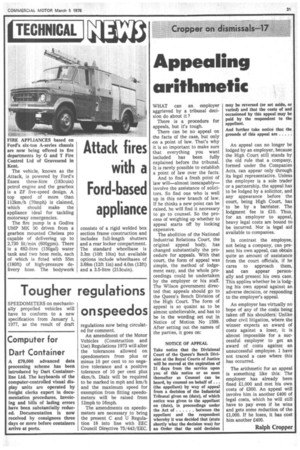Appealing arithmetic
Page 33

If you've noticed an error in this article please click here to report it so we can fix it.
WHAT can an employer aggrieved by a tribunal decision do about it ?
There •is a procedure for appeals, but it's tough.
There can be no appeal on the facts of the case, but only on a point of law. That's why it is so important to make sure that everything you want included has been fully explained before the tribunal. It is rarely possible to establish a point of law over the facts.
And to find a fresh point of law will—almost inescapably— involve the assistance of solicitors. So find one who is well up in this new branch of law. If he thinks a new point can be raised, he will find it necessary to go to counsel. So the process of weighing up whether to appeal starts off by looking expensive.
The abolition of the National Industrial Relations Court, the original appeal body, has changed substantially the procedure for appeals. With that court, the form of appeal was simple, the method of lodgement easy, and the whole proceedings could be undertaken by the employer or his staff. The Wilson government directed that appeals should go to the Queen's Bench Division of the High Court. The form of appeal is so quaint as to be almost unbelievable, and has to be in the wording set out in Notice of Motion No 1599. After setting out the names of the parties, it goes on:
NOTICE OF APPEAL
Take notice that the Divisional Court of the Queen's Bench Division at the Royal Courts of Justice will be moved at the expiration of 21 days from the service upon you of this notice or so soon thereafter as Counsel can be heard, by counsel on behalf of . . . (the appellant) by way of appeal from a decision of the Industrial Tribunal given on (date), of which notice was given to the appellant on (date), in proceedings under the Act of between the appellant and the respondent whereby it was decided that (state shortly what the decision was) for an Order that the said decision
may be reversed (or set aside, or varied) and that the costs of and occasioned by this appeal may be paid by the respondent to the appellant.
And further take notice that the grounds of this appeal are
An appeal can no longer be lodged by an employer, because the High Court still stands by the old rule that a company, formed under the Companies Acts, can appear only through its legal representative. Unless the employer is a sole trader or a partnership, the appeal has to be lodged by a solicitor, and any appearance before the court, being High Court, has to be by a barrister. The lodgment fee is £10. Thus, for an employer to appeal, heavy legal costs are bound to be incurred. Nor is legal aid available to companies.
In contrast the employee, not being a company, can present his own appeal, can obtain quite an amount of assistance from the court officials, if he cares to approach them, and can appear personally and present his own case. This applies whether he is lodging his own appeal against an adverse decision, or responding to the employer's appeal.
An employer has virtually no hope of any of the costs being taken off his shoulders. Unlike other civil litigation, where the winner expects an award of costs against a loser, it is almost impossible for a successful employer to get an award of costs against an unsuccessful employee. I have not traced a case where this has occurred.
The arithmetic for an appeal is something like this: The employer has already been fined £1,000 and met his own costs of £300. An appeal will involve him in another £400 of legal costs, which he will still have to pay even if he wins and gets some reduction of the £1,000. If he loses, it has cost him another £400.
Ralph Cropper




















































































































































